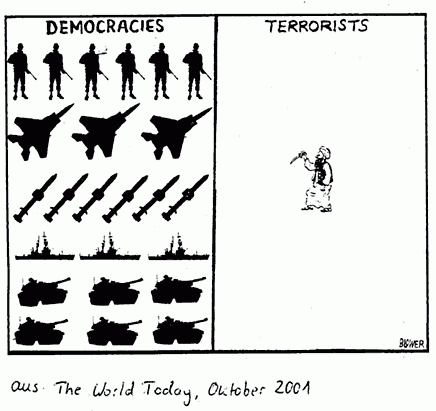(13 Participants)
Moderation Sepp Rottmayr, Minutes Wolfgang Steuer
First Issue
“Can the dominating Theory of the Ultima Ratio correspond with Conscience?”
REPORT
The Workshop started at 14 PM and ended at 16 PM. Languages used were German and English. Contributions were translated into either German or English by an interpreter.
The starting point for ‘Ultima Ratio’ (meaning war as last means) was presented with 3 theses, which were supposed to further either anti-theses or supportive ones during discussion. Exchange of thoughts was arranged in a round table way in order to enable everybody to join.
Starting issue was Conscience
- First Thesis concerning Conscience
Conscience is not optional but a law, which comes from the human heart and leads to objective norms of morals (ethics).
This thesis was established and precisely defined as follows: Conscience is given to mankind by way of a divine instance and is not subject to willpower, education and culture. It works like an inner voice, not as a law (too narrow) but as a kind of inner knowledge (given knowledge), awareness or better consciousness, liable to a higher authority. Conscience is based on philanthropy (love of mankind), goodness and non-violence as we learned from words of founders of great religions and teachers of wisdom in different cultures. It does not belong to a special culture or religion. Conscience is built by patterns, standards, environment, deep engagement, dispute and mainly by loving attention experienced during childhood and adolescence. Those who experienced loving care and protection feel more secure with decisions of their conscience. Decisions of conscience lead a person to be in deep accord with the inner self. When deciding against conscience, this inner harmony is missing. Insofar this feeling of being in accord with your inner voice is a proof of acting with or against convictions of conscience.
- Second Thesis concerning conscience
Conscience can be subdued, mute or underdeveloped by ideologies (e.g. nationalism), custom (military), ignorance (e.g. racism), hatred, revenge, envy (e.g. 9.11.), majority rule (e.g. majority rule), anxiety (e.g. possible loss of something precious), inexperience (e.g. missing experience of borderline situations), but conscience is never astray.
This thesis was continued. Some decisions come along as decisions of conscience but are none. They produce violence (Fighting terrorism, defence of home country, protection of people against evil etc.). Temptation towards evil, which is part of being human, is said to make us choose death instead of life. Therefore conscience can be superimposed or stupefied. But as conscience is experienced as inner divine spark, glowing in each end every human being, which means, that it derives from higher authority, meaning conscience basically can not be astray.
- Third Thesis concerning conscience
Conscience can approach and rectify the killing of people or leave them to die in order to save others (i.e. putting an end to pain, or on a lifeboat the boat is overloaded).
This thesis found unanimous contradiction. As opposed to it, there were samples given like the Stauffenberg attempt on Hitler's life, the objection to military service by Franz Jagerstätter or the keeping-himself-at-disposal of Maximilian Kolbe. May be there is something coming from conscience, like self sacrifice for the life of others, but never killing others with or without self sacrifice. The sentence of Dietrich Bonhöffer deserves consideration:
Serving life, we can take guilt upon us.
As a result, it was stated, that conscience could not approach or rectify to kill people or leave them to die.
The Discussion then turned to the ‘Ultima Ratio’ in the sense of military might as last resort.
- First Thesis concerning Ultima Ratio
- There is no notable point of time, from when on all civil means of conflict solution are exhausted.
- There is no objective constraint, demanding the solution of a conflict by military might.
- This thesis was the stated conviction of all participants. Military might as supposedly last means of solving conflicts creates injuries and renewed violence, it is life threatening and tries to keep other reasons hidden, p. c. economical reasons for wars.
- Second Thesis concerning Ultima Ratio
The doctrine of Ultima Ratio results in millions of war participants and promotes the ethical rectification of wars.
The theory of war as a last means serves propaganda and the drive for sensations of the media
- Third Thesis concerning Ultima Ratio
The Theory of Ultima Ratio was developed by Christianity and is well accepted by Jewish and Islamic religious law, but is not covered by the gospel of Jesus.
The theory of the ‘just war’ as last means was developed by Augustinus, Thomas of Aquin, and other theologians in order to prevent war or to decrease tension. Practically it served the constitutional church and the worldly power as authentication for use of violence, including killing and warfare. Its basic pretensions can not come into accord with the teachings of Jesus and fundamental convictions of many religions, including the Islam. As an ethical standard, it is not acceptable.
As a conclusion to our discussion we developed a vote proposal for the conference, which the conference put into the final declaration.
Footnote of the moderator:
In our discussion conscience was seen as a divine instance and divine spark, experienced as coming from outside, confronting a human being to take responsibility. Therefore, it cannot be sufficient to call it ‘with our conscience’. There could be the conclusion, that others have another conscience. It is not easy to imagine and even more difficult to accept that a divine instance urges upon different people opposite ways of conscientious action (p.c. kill or don't). Nonetheless discussion brought it out conscience can lead to different standards, shaped by cultural context, though they would not be contradictory.
The term ‘with our conscience’ meant to express modesty during our congress, being open for dialogue about this important ethical question and to look for deeply serious efforts to find answers to it.

